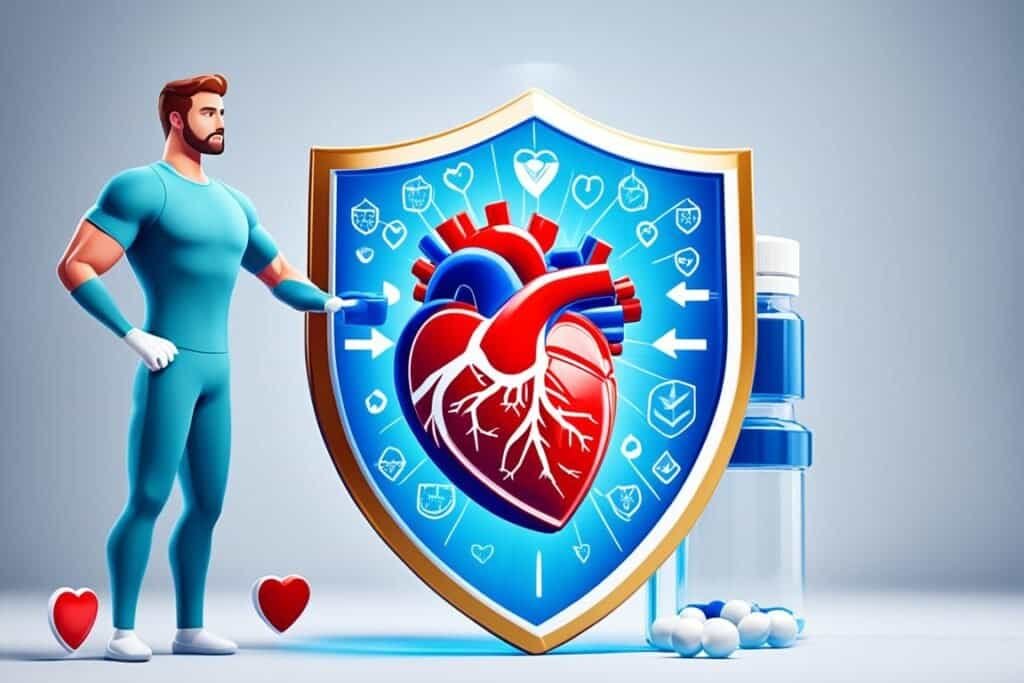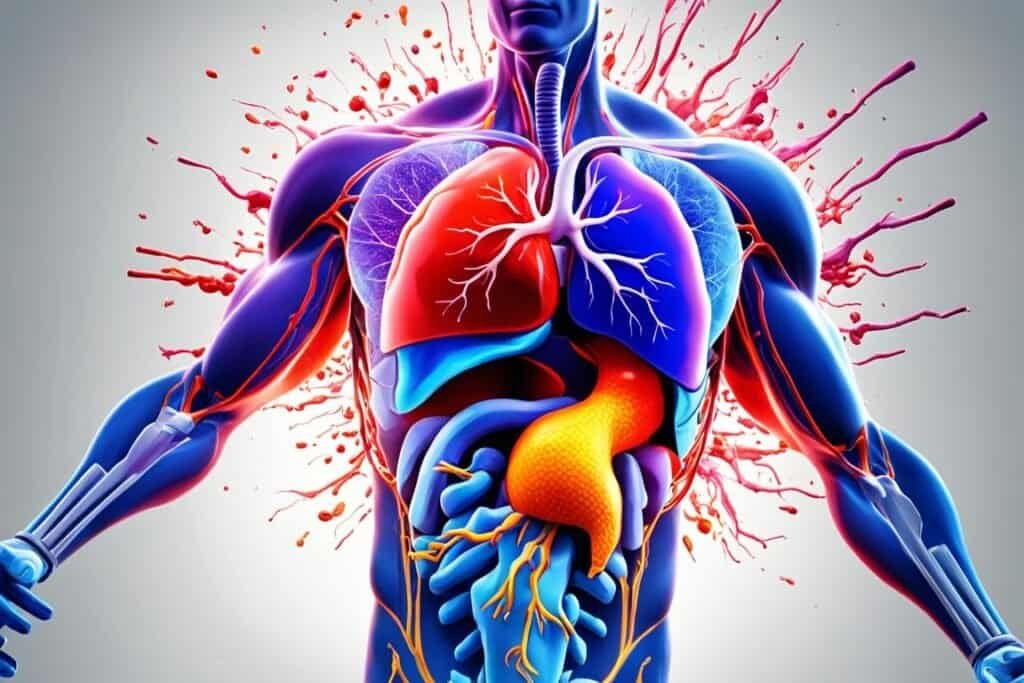Welcome to our article on the impact of cholesterol medications on the primary prevention of heart disease. In today’s fast-paced world, it’s crucial to prioritize our cardiovascular health. Cholesterol management plays a key role in reducing the risk of heart disease and promoting overall well-being. Let’s explore the benefits of cholesterol-lowering drugs, such as statins, and their impact on heart disease prevention.
Cholesterol medications are designed to target and lower the levels of “bad” cholesterol, known as low-density lipoprotein (LDL), in our bodies. By doing so, they help protect against the development of conditions like coronary heart disease, heart attacks, and strokes. Despite the controversy surrounding their use, reliable research and large clinical trials consistently demonstrate the benefits of cholesterol-lowering drugs in reducing the risk of death from heart disease, regardless of age.
Reducing heart disease risk is a primary goal for healthcare professionals, and cholesterol medications are an essential tool in achieving this. By understanding and incorporating the evidence and guidelines surrounding cholesterol management, we can make informed decisions to safeguard our cardiovascular health. Now, let’s delve deeper into this crucial topic to gain a better understanding of how cholesterol meds can protect our hearts.
Key Takeaways:
- Cholesterol medications, such as statins, play a crucial role in the primary prevention of heart disease.
- They effectively lower LDL cholesterol levels, reducing the risk of developing conditions like coronary heart disease, heart attacks, and strokes.
- Reliable research and large clinical trials consistently demonstrate the benefits of cholesterol-lowering drugs in reducing the risk of death from heart disease.
- It’s important to understand and follow evidence-based guidelines for cholesterol management to effectively reduce heart disease risk.
- Cholesterol medications are a vital tool in protecting cardiovascular health and promoting overall well-being.
The Controversy Surrounding Cholesterol Levels and Life Expectancy
In recent years, the relationship between high cholesterol levels and life expectancy has been a topic of debate and controversy. A study led by Dr Uffe Ravnskov at the University of Lund in Sweden has suggested that elevated cholesterol levels in older individuals may actually be associated with longer life expectancy. However, it is crucial to consider the limitations of this study and the broader body of evidence when evaluating the impact of cholesterol medication on the primary prevention of heart disease.
The study conducted by Dr Ravnskov has been met with criticism due to its limited and biased approach. Critics argue that the research heavily relied on aggregated and inconsistent information from published sources, potentially leading to bias in the study’s conclusions. Furthermore, the study overlooked relevant research that supports the benefits of cholesterol-lowering medications, such as statins.
It is important to note that the current cardiovascular prevention guidelines emphasize the benefits of statin treatment and the significant role of cholesterol in heart disease. Randomized trials of statin therapy have consistently demonstrated a reduction in the risk of death overall and from heart disease, strengthening the case for cholesterol medication as an effective preventive measure.
The Role of LDL Cholesterol and Limitations of the Study
LDL cholesterol, also known as “bad” cholesterol, plays a key role in the development of heart disease. Studies have shown that elevated levels of LDL cholesterol increase a person’s risk of developing conditions such as coronary heart disease, heart attack, and stroke. While the study by Dr Ravnskov suggests a potential inverse relationship between cholesterol levels and life expectancy in older individuals, it is essential to consider the limitations of the research.
- The study relied on a small number of studies and may not encompass a comprehensive body of evidence.
- It overlooked the numerous randomized trials that support the benefits of cholesterol-lowering medications.
- The aggregated and inconsistent information used in the study raises questions about the reliability of the findings.
- The potential bias in the study’s conclusions further underlines the need for a cautious interpretation of the results.
While the study by Dr Ravnskov has sparked controversy, it is crucial to evaluate it within the context of the broader evidence. The consensus among experts is that cholesterol-lowering medications, such as statins, have proven benefits in reducing the risk of heart disease and improving overall cardiovascular health. Current guidelines advocate for the use of these medications in high-risk individuals, regardless of age, to effectively manage cholesterol levels and prevent heart disease complications.
| Key Points |
|---|
|
While the study by Dr Ravnskov raises interesting questions, it is essential to approach the findings with caution due to the limitations and potential bias. The consensus among experts remains that cholesterol-lowering medications, such as statins, play a crucial role in cardiovascular prevention and reducing the risk of heart disease. As research continues in this field, it is imperative to stay informed about the latest developments and consult with healthcare professionals for personalized guidance on cholesterol management and heart disease prevention.
The Importance of Cholesterol Medication for High LDL Levels
If you have high levels of low-density lipoprotein (LDL) cholesterol and no established heart disease, it is crucial to consider the use of cholesterol medication to reduce your risk of heart disease-related deaths. Recent research conducted by Professor Kausik Ray and his team at Imperial College London and the University of Glasgow has provided conclusive evidence supporting the effectiveness of statins for individuals with very high LDL levels.
The study focused on the daily use of the statin pravastatin and found that it reduced deaths from heart disease by more than a quarter in individuals with high LDL levels. These findings highlight the mortality benefits of statin usage for those at risk of heart disease, emphasizing the importance of LDL reduction in the primary prevention of heart disease.
Furthermore, the study challenges the current approach of a “watch and wait” strategy for younger patients with slight cholesterol elevations. It suggests that even modest LDL reductions over time can lead to significant improvements in mortality rates. As such, timely intervention through the use of cholesterol medication can provide long-term benefits by reducing the risk of heart disease-related deaths.
Guidelines for Treating High LDL
Based on the evidence from trials and the findings of this study, healthcare professionals recommend the following guidelines for treating high LDL levels:
- Identify individuals with high LDL levels and no established heart disease.
- Consider the use of statins, such as pravastatin, as an effective cholesterol medication.
- Monitor LDL levels regularly to track the progress of cholesterol reduction.
- Educate patients about the importance of adhering to medication and lifestyle modifications to achieve optimal results.
- Collaborate with healthcare professionals to evaluate the long-term risk of heart disease and adjust medication dosage accordingly.
Following these guidelines can help individuals with high LDL levels effectively manage their cholesterol and significantly reduce their risk of heart disease-related complications. It is important to prioritize cholesterol reduction and work closely with healthcare professionals to develop a personalized treatment plan tailored to your specific needs.
| Benefits of Cholesterol Medication for High LDL Levels | Guidelines for Treating High LDL |
|---|---|
| Reduces deaths from heart disease | Identify individuals with high LDL levels and no established heart disease |
| Significant mortality benefits | Consider the use of statins, such as pravastatin, as an effective cholesterol medication |
| Long-term risk reduction of heart disease | Monitor LDL levels regularly to track the progress of cholesterol reduction |
| Educate patients about the importance of adhering to medication and lifestyle modifications to achieve optimal results | |
| Collaborate with healthcare professionals to evaluate the long-term risk of heart disease and adjust medication dosage accordingly |

The study conducted by Professor Kausik Ray and his team emphasizes the importance of LDL reduction through the usage of cholesterol medication for individuals with high LDL levels and no established heart disease. By adhering to the guidelines and actively managing cholesterol levels, you can significantly lower your long-term risk of heart disease-related complications and improve your overall cardiovascular health.
A Revolutionary Treatment for High Cholesterol
Introducing inclisiran, a groundbreaking drug that has recently been approved by the National Institute for Health and Care Excellence (Nice) for use in the NHS in England. This innovative medication has shown remarkable effectiveness in reducing cholesterol levels, even for patients who have previously tried using statins.
Inclisiran works by boosting the liver’s natural ability to reduce the body’s level of “bad” cholesterol, also known as low-density lipoprotein (LDL) cholesterol. It is particularly beneficial for individuals with primary hypercholesterolaemia or mixed dyslipidaemia, conditions characterized by dangerously high levels of LDL cholesterol and an increased risk of heart attacks and strokes.
One of the key advantages of inclisiran is its long-lasting effect. This treatment is administered as a twice-yearly injection, ensuring convenient and consistent cholesterol management for patients. By significantly reducing LDL cholesterol levels, inclisiran offers a promising solution for improving long-term outcomes and preventing cardiovascular events.

This image visually represents the liver, the organ responsible for cholesterol metabolism. Inclisiran leverages the liver’s natural ability to reduce cholesterol and provides an effective treatment option for high cholesterol.
With its introduction, inclisiran brings new hope and possibilities in the primary prevention and treatment of high cholesterol. Its effectiveness, particularly in patients who have not achieved desired cholesterol levels with statins alone, makes inclisiran a promising addition to the arsenal of cholesterol-lowering medications.
As research and development in cholesterol treatments continue, inclisiran offers a glimpse into the future of cardiovascular health. By targeting the root cause of high cholesterol and its associated risks, this revolutionary treatment has the potential to significantly reduce heart attacks and strokes, improving the overall well-being of individuals at high risk of cardiovascular disease.
Key Benefits of Inclisiran:
- Highly effective in reducing cholesterol levels
- Suitable for patients who have previously tried statins
- Boosts the liver’s ability to reduce “bad” cholesterol
- Treatment for primary hypercholesterolaemia and mixed dyslipidaemia
- Potential reduction in heart attacks and strokes
Inclisiran represents a significant breakthrough in the field of cholesterol management. With its unique approach and impressive results, this innovative drug paves the way for improved cardiovascular health and a brighter future for individuals with high cholesterol.
Conclusion
Cholesterol medications have a significant impact on the primary prevention of heart disease. Despite controversies and conflicting studies, reliable research and large clinical trials consistently demonstrate the benefits of cholesterol-lowering drugs, such as statins, in reducing the risk of death from heart attacks and strokes. These medications play a crucial role in cholesterol management and the prevention of heart disease.
Regardless of age, high-risk individuals can benefit from the use of cholesterol medications. The evidence supports their effectiveness in reducing heart disease risk and improving overall cardiovascular health. By lowering the levels of “bad” cholesterol, these medications help to protect against conditions such as coronary heart disease, heart attacks, and strokes.
In addition to current treatments, the future of cholesterol management holds promising potential. The introduction of innovative treatments like inclisiran offers hope for further advancements in reducing cholesterol levels and preventing heart disease. As research continues, it is important to stay informed about the latest developments and work closely with healthcare professionals to optimize the use of cholesterol medications and improve long-term cardiovascular outcomes.

